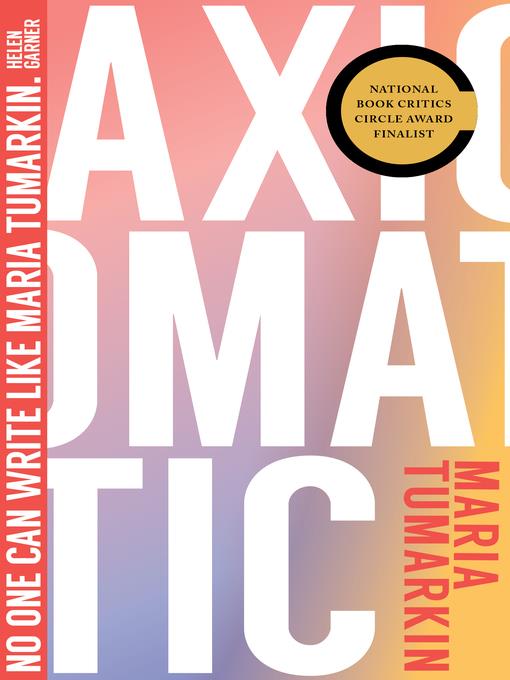
Axiomatic
کتاب های مرتبط
- اطلاعات
- نقد و بررسی
- دیدگاه کاربران
نقد و بررسی

July 1, 2019
A book of extended annotations of familiar axioms that challenges readers to connect a lot of dots. Born and raised in Ukraine when it was then part of the Soviet Union, Tumarkin (Otherland: A Journey With My Daughter, 2010, etc.) immigrated to Australia as a teenager and has continued to live and work there as a cultural historian and writer. She has maintained that the five parts of her latest book--the winner of the 2018 Melbourne Prize for Literature's Best Writing Award--should not be considered as separate pieces. However, most of them could stand on their own as well-reported literary journalism, with the author very present in her own work in a manner occasionally reminiscent of Joan Didion. Tumarkin explores the fragility of adolescence, the generational perpetuation of poverty and addiction, the manner in which suicide defies easy explication or rationalization, and, throughout, "the nature of human nature" and the failures of Australia's culture and legal system to accommodate the vagaries and nuances of human behavior. The most powerful--and perhaps most straightforward--section, titled, "Those who forget the past are condemned to re--," concerns a grandmother imprisoned for hiding her grandson from his estranged mother, who has regained custody after her husband's death and will subject her children to the mistreatment of her thuggish soon-to-be husband. "I came to this country thinking it was a civilised society," said the grandmother," a Holocaust survivor who had expected so much better of Australia. "How wrong I was. It's a wild, wild West. A modern country filled with barbarians." While this passage isn't the only indictment of the author's adopted country, her work is more of an illumination of the human condition. Tumarkin asks deep, difficult questions and refuses to settle for easy answers. Provocative reading for those willing to put in the effort.
COPYRIGHT(2019) Kirkus Reviews, ALL RIGHTS RESERVED.

Starred review from July 15, 2019
Examining the theme of trauma and grief over the course of five extended essays, cultural historian Tumarkin (Otherland) presents a remarkable tour de force. Each essay derives its title from a different axiom—to pick two: “You Can’t Enter the Same River Twice” and “Time Heals All Wounds,”—and explores an easily sensationalized subject, such as, in the latter, teen suicide. That the essays come across as original is a testament to their artful construction, as they organically navigates the networks of a community and evoke a larger system through its smaller components. “Time Heals All Wounds” delves into the repercussions of teen suicide for families, schools, and communities, and moves through different stories as if they were all part of the same larger case. In addition to trauma, the essays also touch on the effects of time, as in “History Repeats Itself,” about a lawyer whose commitment to “being embedded in the community, walking the streets, using the same public transport as my clients” causes Tumarkin to reflect on how time “lets trust stick, and relationships take anchor.” Perhaps most impressive is how Tumarkin openly courts, yet escapes, cliché. These essays will linger in readers’ minds for years after.

























دیدگاه کاربران